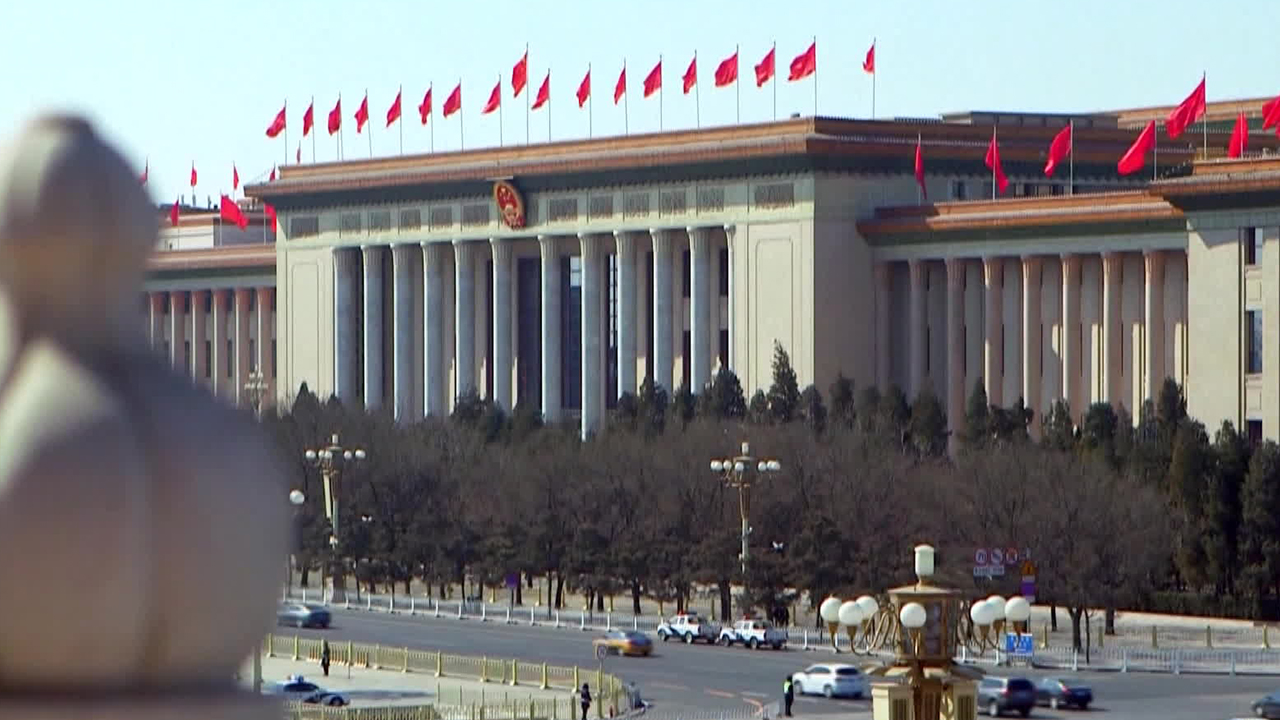China to tackle local debt crisis amid Trump's looming tariffs
입력 2024.11.09 (00:29)
읽어주기 기능은 크롬기반의
브라우저에서만 사용하실 수 있습니다.
[Anchor]
China, the target of President-elect Trump's pledged 60% tariff, is hastening preparations in response.
First, China plans to invest 2,000 trillion won to address the hidden debts of local governments, which are considered the biggest ticking time bomb for the Chinese economy.
Beijing correspondent Kim Min-jung reports.
[Report]
As of last year, China's national debt ratio compared to its GDP neared 300%.
The chronic problem of the economy is local government debt, and the situation has worsened as the real estate market, which was the main source of fiscal revenue, has fallen into a long-term recession.
[Robert Lawrence Kuhn/International Business Strategist/2023: "China's real estate sector which has been battered by huge debt, weak demand, and falling prices. Evergrande having declared bankruptcy, and Country Garden is on the brink of default."]
China has decided to pour about 2,000 trillion won into resolving local government debts, which are referred to as hidden debts.
They will increase the debt ceiling by about 1,163 trillion won and issue special local government bonds amounting to 775 trillion over the next five years.
While attention has been focused on the response to President-elect Trump's declaration of a 60% tariff on Chinese products, it seems they are concentrating on resolving internal issues.
As President Xi Jinping stated in a congratulatory message to President-elect Trump, if China and the U.S. fight, both sides will be hurt, indicating a cautious approach to avoid confrontations from the start of Trump's second administration.
However, if the tariff bomb materializes, forecasts suggest that China's economic growth rate could drop by 2 percentage points.
In a situation where domestic consumption has not recovered, the shock from a decrease in exports could make the economy even more difficult.
There are still skeptical views regarding the achievement of this year's economic growth target of 5%.
With the risk of tariffs still looming, many observers believe it remains to be seen whether the Chinese economy can rebound.
This is Kim Min-jung from KBS News in Beijing.
China, the target of President-elect Trump's pledged 60% tariff, is hastening preparations in response.
First, China plans to invest 2,000 trillion won to address the hidden debts of local governments, which are considered the biggest ticking time bomb for the Chinese economy.
Beijing correspondent Kim Min-jung reports.
[Report]
As of last year, China's national debt ratio compared to its GDP neared 300%.
The chronic problem of the economy is local government debt, and the situation has worsened as the real estate market, which was the main source of fiscal revenue, has fallen into a long-term recession.
[Robert Lawrence Kuhn/International Business Strategist/2023: "China's real estate sector which has been battered by huge debt, weak demand, and falling prices. Evergrande having declared bankruptcy, and Country Garden is on the brink of default."]
China has decided to pour about 2,000 trillion won into resolving local government debts, which are referred to as hidden debts.
They will increase the debt ceiling by about 1,163 trillion won and issue special local government bonds amounting to 775 trillion over the next five years.
While attention has been focused on the response to President-elect Trump's declaration of a 60% tariff on Chinese products, it seems they are concentrating on resolving internal issues.
As President Xi Jinping stated in a congratulatory message to President-elect Trump, if China and the U.S. fight, both sides will be hurt, indicating a cautious approach to avoid confrontations from the start of Trump's second administration.
However, if the tariff bomb materializes, forecasts suggest that China's economic growth rate could drop by 2 percentage points.
In a situation where domestic consumption has not recovered, the shock from a decrease in exports could make the economy even more difficult.
There are still skeptical views regarding the achievement of this year's economic growth target of 5%.
With the risk of tariffs still looming, many observers believe it remains to be seen whether the Chinese economy can rebound.
This is Kim Min-jung from KBS News in Beijing.
■ 제보하기
▷ 카카오톡 : 'KBS제보' 검색, 채널 추가
▷ 전화 : 02-781-1234, 4444
▷ 이메일 : kbs1234@kbs.co.kr
▷ 유튜브, 네이버, 카카오에서도 KBS뉴스를 구독해주세요!
- China to tackle local debt crisis amid Trump's looming tariffs
-
- 입력 2024-11-09 00:29:23

[Anchor]
China, the target of President-elect Trump's pledged 60% tariff, is hastening preparations in response.
First, China plans to invest 2,000 trillion won to address the hidden debts of local governments, which are considered the biggest ticking time bomb for the Chinese economy.
Beijing correspondent Kim Min-jung reports.
[Report]
As of last year, China's national debt ratio compared to its GDP neared 300%.
The chronic problem of the economy is local government debt, and the situation has worsened as the real estate market, which was the main source of fiscal revenue, has fallen into a long-term recession.
[Robert Lawrence Kuhn/International Business Strategist/2023: "China's real estate sector which has been battered by huge debt, weak demand, and falling prices. Evergrande having declared bankruptcy, and Country Garden is on the brink of default."]
China has decided to pour about 2,000 trillion won into resolving local government debts, which are referred to as hidden debts.
They will increase the debt ceiling by about 1,163 trillion won and issue special local government bonds amounting to 775 trillion over the next five years.
While attention has been focused on the response to President-elect Trump's declaration of a 60% tariff on Chinese products, it seems they are concentrating on resolving internal issues.
As President Xi Jinping stated in a congratulatory message to President-elect Trump, if China and the U.S. fight, both sides will be hurt, indicating a cautious approach to avoid confrontations from the start of Trump's second administration.
However, if the tariff bomb materializes, forecasts suggest that China's economic growth rate could drop by 2 percentage points.
In a situation where domestic consumption has not recovered, the shock from a decrease in exports could make the economy even more difficult.
There are still skeptical views regarding the achievement of this year's economic growth target of 5%.
With the risk of tariffs still looming, many observers believe it remains to be seen whether the Chinese economy can rebound.
This is Kim Min-jung from KBS News in Beijing.
China, the target of President-elect Trump's pledged 60% tariff, is hastening preparations in response.
First, China plans to invest 2,000 trillion won to address the hidden debts of local governments, which are considered the biggest ticking time bomb for the Chinese economy.
Beijing correspondent Kim Min-jung reports.
[Report]
As of last year, China's national debt ratio compared to its GDP neared 300%.
The chronic problem of the economy is local government debt, and the situation has worsened as the real estate market, which was the main source of fiscal revenue, has fallen into a long-term recession.
[Robert Lawrence Kuhn/International Business Strategist/2023: "China's real estate sector which has been battered by huge debt, weak demand, and falling prices. Evergrande having declared bankruptcy, and Country Garden is on the brink of default."]
China has decided to pour about 2,000 trillion won into resolving local government debts, which are referred to as hidden debts.
They will increase the debt ceiling by about 1,163 trillion won and issue special local government bonds amounting to 775 trillion over the next five years.
While attention has been focused on the response to President-elect Trump's declaration of a 60% tariff on Chinese products, it seems they are concentrating on resolving internal issues.
As President Xi Jinping stated in a congratulatory message to President-elect Trump, if China and the U.S. fight, both sides will be hurt, indicating a cautious approach to avoid confrontations from the start of Trump's second administration.
However, if the tariff bomb materializes, forecasts suggest that China's economic growth rate could drop by 2 percentage points.
In a situation where domestic consumption has not recovered, the shock from a decrease in exports could make the economy even more difficult.
There are still skeptical views regarding the achievement of this year's economic growth target of 5%.
With the risk of tariffs still looming, many observers believe it remains to be seen whether the Chinese economy can rebound.
This is Kim Min-jung from KBS News in Beijing.
-
-

김민정 기자 mjnews@kbs.co.kr
김민정 기자의 기사 모음
-
이 기사가 좋으셨다면
-
좋아요
0
-
응원해요
0
-
후속 원해요
0










![[속보] 심우정 검찰총장 사의 표명…오후 3시 입장 <br>발표](/data/layer/904/2025/07/20250701_1Gcu1S.jpg)
![[속보] 내란 특검, 윤 전 대통령에게 “5일 오전 9시까지 출석” 통지](/data/layer/904/2025/07/20250701_6mdRFo.jpg)

![[영상] 정성호 “검찰 해체 표현 적절치 않아…수사·기소 분리 국민 공감대”](/data/fckeditor/vod/2025/07/01/305901751367182615.png)

이 기사에 대한 의견을 남겨주세요.